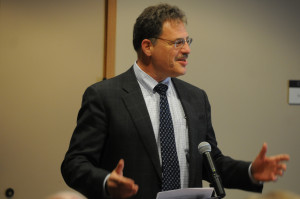Officials from the Chinese and U.S. governments believe the results of the Jan. 2012 Taiwanese presidential election will benefit their respective national interests, said Alan Romberg, director of the East Asia program at the Stimson Center, during a talk at the Center for International Security and Cooperation (CISAC) Tuesday night. He added, however, that the future of Taiwan’s relationship with each of these countries still remains uncertain.
The Center for Democracy, Development, and the Rule of Law (CCDRL) sponsored the talk, entitled “The Taiwan Presidential Election: Implications for Cross-Strait Relations and U.S. Policy,” as part of its Democracy in Taiwan Project.
Larry Diamond, CCDRL director and senior fellow at the Hoover Institute, introduced Romberg as “one of the most distinguished and knowledgeable scholars on East Asia who enjoys respect on both sides of the political spectrum in Taiwan.”

Romberg has served as a fellow on the Council of Foreign Relations and as a U.S Foreign Service Officer for 20 years. He has held key positions in the State Department, including Deputy Director of Policy Planning Staff, Director of the Office of Japanese Affairs and a placement on the National Security Council for China.
Romberg began his talk by giving an overview of Taiwan’s political scene and the dynamics and statistics of the recent Jan. 14 election, which resulted in President Ma Ying-Jeou being re-elected for a second-term.
Ma is a member of the country’s Guomindang (GMD) Party, one of two main political parties in Taiwan. According to Romberg, GMD advocates a friendly but cautious relationship with China. He said the party’s main opponent, the Democratic Progressive Party (DPP), has a more pro-Taiwanese independence stance and holds a suspicious view of Taiwan’s relationship with China.
“Ma had a solid victory that will lay a foundation for further progress on all sides of this triangle [U.S-China-Taiwan],” Romberg said. “But his reduced margin of victory compared to the 2008 elections reflects the recovery of the DPP and widespread ambivalence in Taiwan about the performance and policies of Ma.”
According to Romberg, the cross-strait conflict played a key role in Ma’s victory as voters were “nervous about how Tsai [the DDP presidential candidate] would handle cross-strait relations.”
He added that last-minute endorsements of Ma by prominent Taiwanese businessmen caused a surge in support for him, noting that 20 percent of voters made their voting decisions a week before the election.
Romberg emphasized that while Ma’s victory demonstrated Taiwanese support for his policies toward China, he must now address widespread dissatisfaction over domestic policies.
He pointed out that a key issue looming over the triangular relationship between the U.S., China and Taiwan is continuing U.S. weapons sales to Taiwan, which irk China.
“The U.S provides weapons to Taiwan in order to assure Beijing does not use force or coercion, but China sees it as a method to limit its rise,” Romberg said.
In terms of the U.S. view of the situation, Romberg pointed out two prominent positions that have become popular. One advocates that the United States stop selling weapons to Taiwan in order to improve relations with China. The other wants the United States to embrace Taiwan more closely in order to form a bulwark against China’s growing power.
“I believe neither position will gain ascendancy or change U.S. policy,” Romberg said.
After the talk, the audience raised questions on a range of issues from the fairness of the democratic system in Taiwan to the diversification of Taiwanese economic investment in Asia.
“I attended this event because I am very interested in U.S.-China relations,” said audience member Reagan Thompson ‘12, “I noticed that he [Romberg] had a very confident assessment of the U.S-China-Taiwan relationship, which is encouraging.”